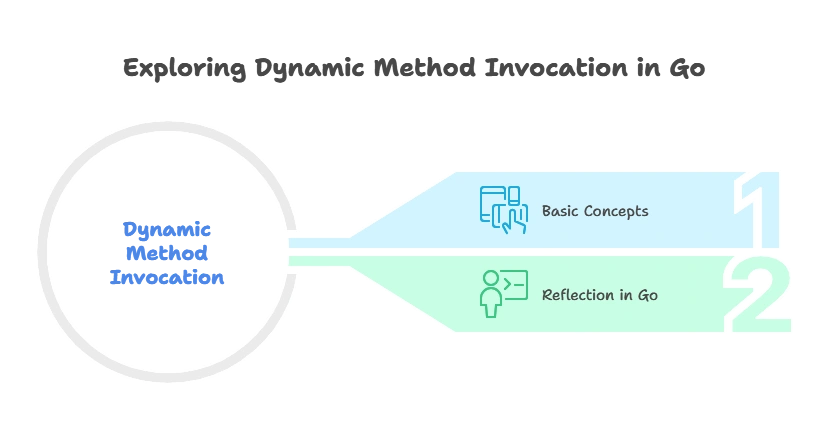Dynamic Method Invocation
Dynamic method invocation in Go refers to the ability to call methods on objects or structs dynamically, at runtime, without knowing their types at compile time. This chapter explores the concept of dynamic method invocation in Go, from basic principles to advanced techniques, providing comprehensive insights and practical examples.
Understanding Dynamic Method Invocation
Basic Concepts
Dynamic method invocation allows programmers to invoke methods on objects or structs without specifying their types explicitly. This flexibility enables dynamic behavior in Go programs, making them more versatile and adaptable to different scenarios.
Reflection in Go
Go’s reflection package (reflect) provides functionality for inspecting and manipulating types, variables, and functions at runtime. Reflection enables dynamic method invocation by allowing developers to access and invoke methods dynamically based on their names and signatures.

Working with Reflection in Go
Retrieving Method Information
The reflect package provides functions like TypeOf and ValueOf to obtain type information and values of variables at runtime. With this information, developers can inspect methods associated with a type and retrieve their names, signatures, and other metadata.
package main
import (
"fmt"
"reflect"
)
type Person struct {
Name string
Age int
}
func (p Person) SayHello() {
fmt.Println("Hello, my name is", p.Name)
}
func main() {
person := Person{Name: "Alice", Age: 30}
// Obtain type information
t := reflect.TypeOf(person)
// Retrieve method information
method := t.Method(0)
fmt.Println("Method Name:", method.Name)
fmt.Println("Method Type:", method.Type)
}
Invoking Methods Dynamically
Using reflection, developers can dynamically invoke methods on objects or structs by constructing and calling function values. The MethodByName function retrieves a method by its name, and the Call method invokes the method with specified arguments.
package main
import (
"fmt"
"reflect"
)
type Person struct {
Name string
Age int
}
func (p Person) SayHello() {
fmt.Println("Hello, my name is", p.Name)
}
func main() {
person := Person{Name: "Alice", Age: 30}
// Obtain type information
t := reflect.TypeOf(person)
// Retrieve and invoke method dynamically
method := t.MethodByName("SayHello")
if method.IsValid() {
// Create a value representing the method receiver
v := reflect.ValueOf(person)
// Invoke the method with no arguments
method.Func.Call([]reflect.Value{v})
}
}
Advanced Techniques
Passing Arguments Dynamically
Reflection enables developers to construct and pass arguments dynamically when invoking methods. This can be particularly useful when the number or types of arguments are not known at compile time.
package main
import (
"fmt"
"reflect"
)
type Calculator struct{}
func (c Calculator) Add(a, b int) int {
return a + b
}
func main() {
calculator := Calculator{}
// Method to invoke dynamically
methodName := "Add"
// Get method by name
method := reflect.ValueOf(calculator).MethodByName(methodName)
if !method.IsValid() {
fmt.Println("Method", methodName, "not found")
return
}
// Prepare arguments dynamically
args := []reflect.Value{reflect.ValueOf(10), reflect.ValueOf(20)}
// Call the method with arguments
result := method.Call(args)
fmt.Println("Result:", result[0].Int())
}
In this example, the Add method of the Calculator struct is invoked dynamically with arguments 10 and 20.
Handling Errors
When working with reflection, it’s essential to handle errors properly to avoid runtime panics. Checking the validity of method calls and handling potential errors ensures the stability and reliability of the program.
package main
import (
"fmt"
"reflect"
)
type Calculator struct{}
func (c Calculator) Divide(a, b float64) (float64, error) {
if b == 0 {
return 0, fmt.Errorf("division by zero")
}
return a / b, nil
}
func main() {
calculator := Calculator{}
// Method to invoke dynamically
methodName := "Divide"
// Get method by name
method := reflect.ValueOf(calculator).MethodByName(methodName)
if !method.IsValid() {
fmt.Println("Method", methodName, "not found")
return
}
// Prepare arguments dynamically
args := []reflect.Value{reflect.ValueOf(10.0), reflect.ValueOf(0.0)}
// Call the method with arguments
result := method.Call(args)
// Check for errors
if len(result) > 1 && !result[1].IsNil() {
fmt.Println("Error:", result[1].Interface().(error).Error())
return
}
// Print result
fmt.Println("Result:", result[0].Float())
}
Modifying Struct Fields Dynamically
Reflection in Go not only allows developers to invoke methods dynamically but also enables them to modify struct fields dynamically. This advanced technique can be useful in scenarios where the structure of data needs to be altered based on runtime conditions.
package main
import (
"fmt"
"reflect"
)
type Person struct {
Name string
Age int
}
func main() {
person := Person{Name: "Alice", Age: 30}
// Obtain the reflect.Value of the struct
v := reflect.ValueOf(&person).Elem()
// Get the reflect.Value of the Name field and modify it
nameField := v.FieldByName("Name")
if nameField.IsValid() && nameField.CanSet() {
nameField.SetString("Bob")
}
fmt.Println("Modified Name:", person.Name)
}
In this example, reflection is used to dynamically modify the Name field of the Person struct.
Creating New Instances Dynamically
Reflection also allows developers to create new instances of types dynamically. This can be useful when the type of an object needs to be determined at runtime, such as when implementing factories or dynamic data processing.
package main
import (
"fmt"
"reflect"
)
type Person struct {
Name string
Age int
}
func main() {
// Get the type of the Person struct
personType := reflect.TypeOf(Person{})
// Create a new instance of the Person struct
newPerson := reflect.New(personType).Elem().Interface().(Person)
fmt.Println("New Person:", newPerson)
}
Dynamic method invocation using reflection in Go provides developers with powerful capabilities to create flexible and dynamic programs. By leveraging reflection, developers can write code that adapts to changing requirements and scenarios, making their applications more versatile and extensible. Happy coding !❤️
